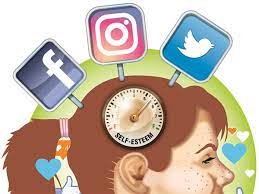The Influence of Social Media on Adolescents’ Self-Esteem
Apr 04, 2023
This paper discusses how the use of social media can have a positive or negative impact on adolescents’ self-esteem. Social media platforms such as Facebook, Twitter, and Instagram provide young people with a platform to share their thoughts and feelings about themselves, allowing them to find acceptance from others and build relationships. However, it has also been found that prolonged usage of social media can negatively affect an adolescent's self-esteem.
Studies have shown that adolescents who spend more time on social media can be at a higher risk of developing low self-esteem, depression, and anxiety.

The paper will look at the potential effects of using social media on adolescents' self-esteem. It will discuss how spending too much time on social media can lead to an increased sense of comparison with peers, which can lead to feelings of inadequacy and envy. Additionally, it will explore how cyberbullying affects adolescent self-esteem by exploring psychological factors such as shame and guilt. Finally, the paper will offer suggestions for parents and educators about ways to monitor their children's use of social media and promote healthy use in order to prevent low self-esteem among adolescents. By examining the impact of social media on adolescent self-esteem, this paper seeks to provide a better understanding of how the use of social media shapes adolescent’s perception and mental health.
The paper will begin by exploring the positive effects that social media can have on adolescents. For example, it will discuss how social media can be used as a platform for adolescents to express themselves and find acceptance from others. It will also look at the potential benefits for adolescents who are able to build and maintain relationships online with peers and adults who may have similar interests or struggles in life.
Next, the paper will examine how extended usage of social media can lead to negative outcomes such as decreased self-esteem among adolescents. It will focus on how comparison with peers, cyberbullying and other psychological factors can contribute to feelings of inadequacy and envy.
Finally, the paper will offer suggestions for parents and educators on how they can help adolescents use social media safely in order to prevent low self-esteem. It will provide tips on setting healthy boundaries and monitoring adolescents’ online activities in order to create a safe environment for them to explore their interests without risking their mental health.
